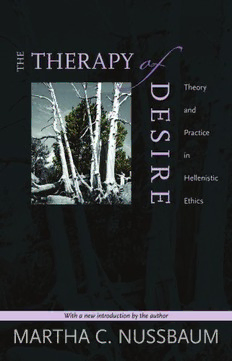
The therapy of desire : theory and practice in Hellenistic ethics PDF
585 Pages·1994·12.867 MB·English
Most books are stored in the elastic cloud where traffic is expensive. For this reason, we have a limit on daily download.
Preview The therapy of desire : theory and practice in Hellenistic ethics
Description:
The Epicureans, Skeptics, and Stoics practiced philosophy not as a detached intellectual discipline, but as a worldly art of grappling with issues of daily and urgent human significance: the fear of death, love and sexuality, anger and aggression. Like medicine, philosophy to them was a rigorous science aimed both at understanding and at producing the flourishing of human life. In this engagingly written book, Martha Nussbaum maintains that these Hellenistic schools have been unjustly neglected in recent philosophic accounts of what the classical "tradition" has to offer. By examining texts of philosophers committed to a therapeutic paradigm - including Epicurus, Lucretius, Sextus Empiricus, Chrysippus, and Seneca - she recovers a valuable source for current moral and political thought and encourages us to reconsider philosophical argument as a technique through which to improve lives. In describing the contributions of Hellenistic ethics, Nussbaum focuses on each thinker's treatment of the question of emotion. All argued that many harmful emotions are based on false beliefs that are socially taught, and that good philosophical argument can transform emotions, and, with them, both private and public life. Written for general readers and specialists, this book addresses compelling issues ranging from the psychology of human passion through rhetoric to the role of philosophy in public and private life. Read more... Abstract: This text argues that the Hellenistic schools have been unjustly neglected in recent philosophical accounts of what the classical "tradition" has to offer. By examining a number of texts, the author encourages the reader to reconsider philosophical argument as a technique used to improve life. Read more...
See more
The list of books you might like
Most books are stored in the elastic cloud where traffic is expensive. For this reason, we have a limit on daily download.
